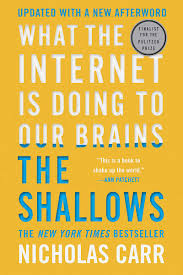The Shallows: What the internet is doing to our brains -- Nicholas Carr

The Shallows This is a fascinating look at “what the internet is doing to our brains”. Better still, it’s an analysis of how technological interfaces from maps, the alphabet, clocks, etc. have changed the way we behave. I found the historical section particularly compelling and the overall message is one that merits deep thought. I’m not sure the analysis of what “the internet” is doing is particularly accurate. The argument is that it’s a medium that fragments our consumption, which detracts from our ability to understand the gestalt. I think that's a true generalization, but I use it to listen to entire books, not fragments, so I'm not sure the fragmentation is necessarily a product of the tool. There is a vain that addresses how search engines foster groupthink, I think that is particularly true and relevant. Thanks, Harrison! Verdict Recommend








